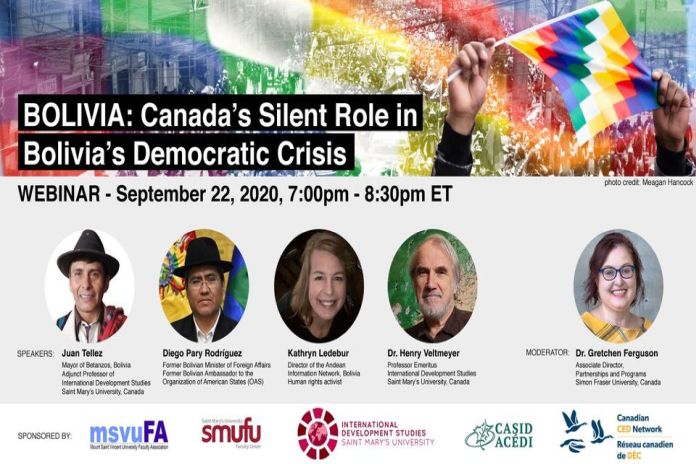Webinar – “BOLIVIA: Canada’s Silent Role in Bolivia’s Democratic Crisis”
Tuesday, September 22, 2020 from 7:00pm to 8:30pm ET
NOVA SCOTIA, Canada – University Faculties (Association and Union) and Department join with Canada-wide community development organizations to co-sponsor Webinar, BOLIVIA: Canada’s Silent Role in Bolivia’s Democratic Crisis, on Tuesday, September 22, 2020, from 7:00 pm to 8:30 pm ET. The Webinar will address Canada’s silence as Bolivia approaches its long-overdue October 18, 2020 elections amidst widespread persecution of human rights defenders, journalists, indigenous leaders and political leaders in Bolivia, including the targeting of Canadian citizen, Juan Tellez, current Mayor of Betanzos, Bolivia.
The moderator of the webinar is Dr Gretchen Ferguson, Associate Director of Partnerships and Programs at Simon Fraser University, BC
Panelists are Juan Tellez, Mayor of Betanzos, Bolivia, Adjunct Professor of International Development Studies at St Mary’s University, NS; Diego Pary Rodríguez, former foreign affairs minister of Bolivia and former ambassador to the Organization of American States (OAS); Kathryn Ledebur, director of the Andean Information Network, Bolivia, and human rights activist; Dr Henry Veltmeyer, founder and Professor Emeritus of the International Development Studies Programme at Saint Mary’s University, NS.
This Webinar is co-sponsored by the International Development Studies Department (IDS) at Saint Mary’s University, the Saint Mary’s University Faculty Union (SMUFU), Mount Saint Vincent University Faculty Association (MSVUFA), Canadian Community Economic Development Network (CCEDNet), and Canadian Association for the Study of International Development (CASID).
On November 10, 2019, the Organization of the American States (OAS), of which Canada is a member, published that there were irregularities in the October 20, 2019, Bolivian election. Hours later, the then Bolivian president, Evo Morales, leader of the Movement to Socialism (MAS) Party was ousted. The same day, Chrystia Freeland, the then Canadian minister of foreign affairs, commented, “We commend the invaluable work of the OAS audit mission in ensuring a fair and transparent process, which we supported financially and through our expertise.” The OAS’s audit has been discredited by several studies.
On November 12, 2019, unelected interim president, Jeanine Áñez, took power. On November 14, 2019, Global Affairs Canada (GAC) expressed support for Áñez’s presidency on the condition that “free and fair elections be held as quickly as possible”.
Henry Veltmeyer, professor Emeritus in International Development Studies at Saint Mary’s University, notes, “the interim (and unelected) government of Senator Jeanine Áñez, who is known for her exceedingly anti-indigenous prejudices and right-wing religious sentiments (‘The city is not for Indians. They had better go to the highlands…’), was formed in the context of a coup that deposed the democratically elected president Evo Morales, the first indigenous leader in history to have formed a government in modern times.”
Veltmeyer adds that the constitution obliges the interim government to hold elections within 90 days of taking office. But despite this, “the Áñez interim government has maintained power for over ten months, and during this period it has carried out massacres of more than 20 indigenous people through police and military operations and continues to systematically persecute political opponents in an effort to prevent the democratically elected but deposed party to participate in the elections. Canada has remained silent on these and other human rights abuses.”
With respect to Juan Tellez, being charged with sedition and terrorism on August 19, 2020, Kathy Ledebur, director of the Andean Information Network in Bolivia states, “The charges against Juan Tellez, Mayor of Betanzos, are a prime example of the campaign of acute political persecution of democratically elected MAS authorities. The persecution is without any evidence and without any basis besides a desire to skew the upcoming elections in Añez’s favour.” Human Rights Watch report, Justice as a Weapon: Political Persecution in Bolivia, supports Ledebur’s conclusions about the Añez government.
The elections in October are unlikely to be free and fair, given the actions of the Áñez interim government, especially if Canada continues its silence in the face of human rights abuses and undemocratic processes.
Webinar event link:
Facebook Event Page: https://www.facebook.com/events/1438213596376316/
Eventbrite.ca Registration Page: https://bolivia-canadas-silent-role.eventbrite.ca/
Related reports and articles:
- United National Human Rights Office of the High Commissioner: The Human Rights Situation in the Aftermath of the 20 October 2019 General Elections in Bolivia
- Harvard Law School’s International Human Rights Clinic: They Shot Us Like Animals: Black November & Bolivia’s Interim Government
- Human Rights Watch: Justice as a Weapon: Political Persecution in Bolivia
- Center for Economic and Policy Research: Observing the Observers: The OAS in the 2019 Bolivian Elections
- Yves Engler: Bolivia’s Strike Exposes Canada’s Undemocratic Policy, August 20, 2020.






